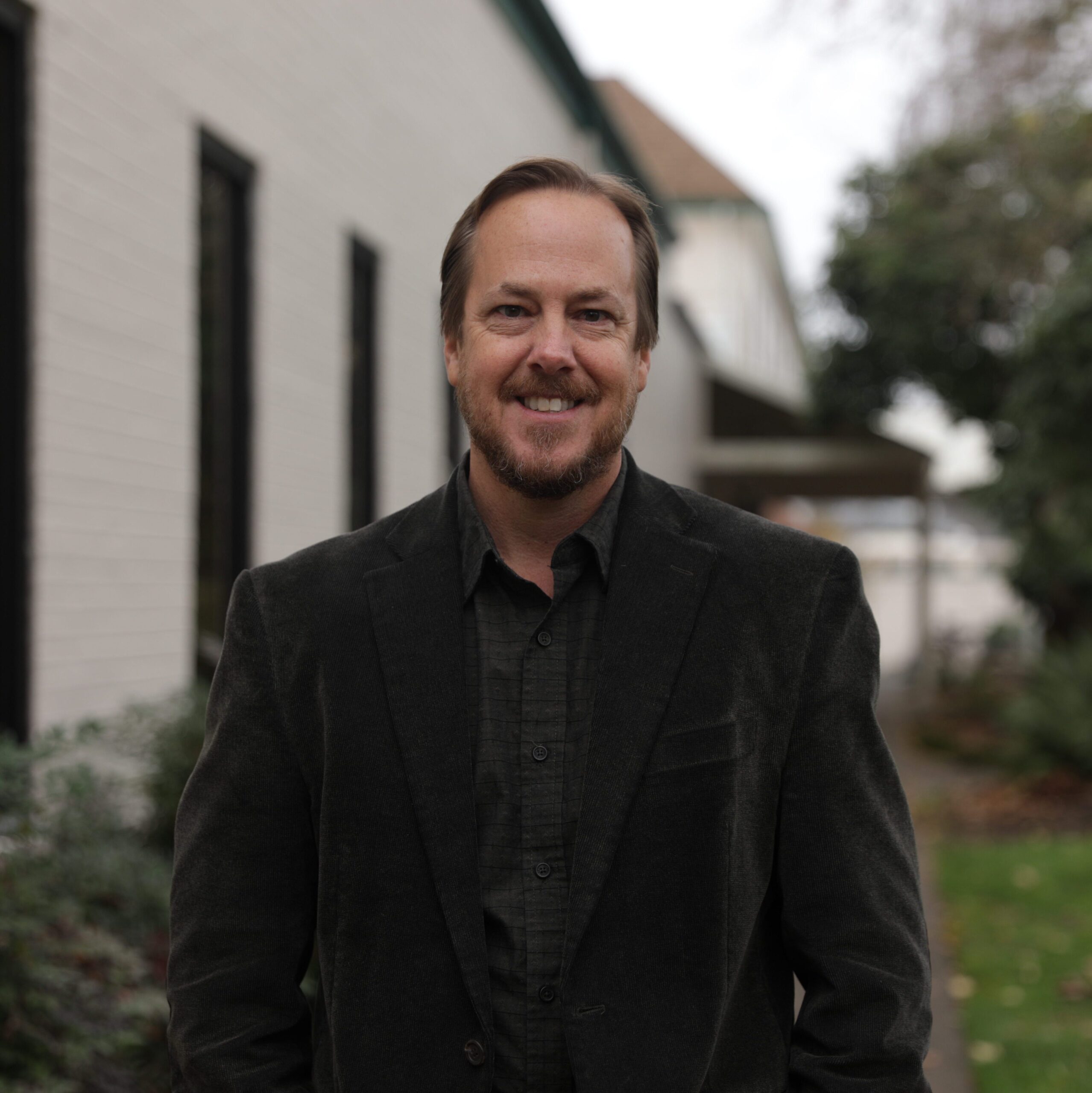
Pictured above: The Mark O. Hatfield Library at Willamette University in Salem, Oregon. This is only one of the many buildings in Oregon named in honor of the late Senator Hatfield and his tremendous legacy as a politician and leader.
The Hatfield Prize honors the legacy of the late Senator Mark Hatfield of Oregon, who modeled what it means to be a Christian in public service. Dr. Joe Slavens, the Vice President of Student Life at Multnomah University, spoke with the Shared Justice team about his time as an intern for the senator between 2002 and 2003. Dr. Greg Burch, also from Multnomah University, joined the conversation. He received the Hatfield Prize this year along with senior Kailani West (‘23), who is researching WIC access for immigrant women in the Rockwood community.

Senator Mark O. Hatfield circa 1967. Photo courtesy of the U.S. Senate Historical Office.
Dr. Joe Slavens serves as the Vice President of Student Life at Multnomah University. Previously, he worked as the Director of Student Life at Simpson University and as an educator within Western Australia’s high school system. He has an M.A. in Pastoral Studies from Multnomah and earned his Ph.D. in higher education at Azusa Pacific University.

Dr. Joe Slavens, Vice President of Student Life at Multnomah University. Photo courtesy of Joe Slavens.
Dr. Greg Burch is Associate Professor and Chair of the Global Studies department at Multnomah University. He also serves as Director for the Graduate Degree Program in Global Development and Justice. Prior to Multnomah, Dr. Burch did nonprofit work in Latin America (Costa Rica and Venezuela) for over a decade.

Dr. Greg Burch, Associate Professor and Chair of the Global Studies Department at Multnomah University. Photo courtesy of Greg Burch.
Emily Fromke: To start us off, I would love to hear a little bit more about you, your career and how you’re connected to the late Senator Hatfield.
Joe Slavens: My name is Dr. Joe Slavens. I am a dual citizen of both Australia and the United States. I work here at Multnomah University alongside the illustrious Dr. Greg Burch. I’m the Vice President of Student Life. My connection with the senator actually came through Multnomah. I remember him coming to our Chapel and speaking, I believe at least once. It was as simple as my friend Jason walking up to him after his speech, and saying “Hey, do you need an intern?” And he said, “I do. Let’s do it.” And so we started an intern program and I was one of, I believe, five interns from Multnomah and so I got to spend a very short, but very rich and fruitful time with the senator.
Greg Burch: And these were his post-Senate years, right?
JS: Yes.
EF: Thank you for that background. What was the senator doing at the time when you interned for him? I missed that.
JS: As I suppose all senators that go off into the sunset, they sit on a zillion boards. Everyone wants a senator on their board, right? So I think that was one of his roles. And Senator Hatfield was also teaching. He taught at George Fox and Portland State. And of course he would do philanthropy and that would be one of my funny stories that I could tell you about.
EF: Well, I am definitely going to ask you about that later then.
JS: Yeah, his chief of staff in D.C. was Gerry Frank of Meier and Frank. It used to be kind of like Nordstrom — a big deal in Oregon, and I think the Pacific Northwest. And Gerry, who was the head of Meier and Frank, was his chief of staff and we can talk about that funny story later.
EF: So what would you say stood out to you about Senator Hatfield’s work and character and what was he passionate about?
JS: He was passionate about everything. The man knew everything, was so smart and was originally an educator. He got his start in education. His gravitas is what captures you. You know, people with gravitas — you look at them from a distance. Not the senator.. He was extremely personal and he was a caring and empathetic man. And he reached across the aisle.
It was about relationships for him. [One day] I’m in the office and Senator Ted Kennedy calls, I believe. But the day before, I believe it was Senator Trent Lott, a Republican who had called or written. Well, if you know your politicians, you know that those are two very different people. But this was a man [Senator Hatfield] who had the friendships, and that’s really what it was about for him, it was about loving people. And I think at some level the senator was a bit chagrined that others didn’t have the same kind of love. That was just normal for him.
EF: Now for the question you’ve already hinted at: What are some memorable moments and stories from your relationship with Senator Hatfield?
JS: Okay, so Meier and Frank is, like I said, like Nordstroms, it’s a retail clothing store, top of the line. And Senators do not make their own schedules. Senator Hatfield didn’t have one of these [cell phones or electronic calendars] necessarily. He had a card, and this comes back from his days when he was the chair of the Appropriations Committee. He would walk in every morning and his secretary would give him a card and he would put it in his coat pocket. And he’d pull it out and he’d just go, “This is my next thing, this is my next thing.”
So his assistant sets him up to be in a runway fashion show for Meier and Frank. Well, of course, he’s going to have to do it because it’s Gerry Frank [his former chief of staff]. And he walks in and he says, “What am I doing in a fashion show? You get me out of that thing right now.” And I’m in there just kind of watching this somewhat tense moment between him and his assistant. And she’s over there doing what she can on the phone and he’s standing there just waiting and he just kind of has his finger out, like, “Come on, get me out of this thing.”
And I look over at him and say, “Hey, senator,” and he looks at me and I say, “I’m really looking forward to you going down that runway.” He’s standing in the door of the office and he looks at me and — I know that for the transcript, you can’t see it — but he does this John Travolta move from Saturday Night Fever. It was the best.
You know, he ended up doing the fashion show. It was fine and I think he really liked it. And I think he went down the runway catwalk and he might have even done a twirl at the end. The man was loved by Oregon. It was hard not to love Senator Hatfield. I wasn’t at the fashion show, but I’m sure he was a huge hit.
EF: That’s so funny. I will say I used to work on the Hill and most of them have iPhones now, but many of them still like the pocket cards.
JS: Another story I have — I told you that the senator knew everything. So we had someone come to the office. She said to the assistant, “I need to speak to the senator.” And I can’t remember which word it was, but let’s just say it was “famine.” She says, “I need to speak to the senator about famine.” I believe it was for a local newspaper. All right, got it. Got it. So the assistant sets them up and scheduled it. The day comes. This woman walks upstairs to this tall building in downtown Portland and walks in. And she says to the assistant, “I am so glad that the senator is willing to talk to me about salmon.” And the assistant’s like, “Oh no. What, you’re here to talk about salmon?” Because the assistant had heard famine, right? So she walks in the senator’s office and goes, “Oh senator, I’m so sorry the reporter is here to talk about salmon.” Well, of course, with the senator, who cares? He can talk about Pluto for all I care, because he knew plenty about Pluto. Not a problem. The journalist walked in, talked to him about salmon and it was easy peasy. Those are a couple of stories I have.
JS: I’m happy to tell you one more story that just came to my head. It’s not as funny, but it’s really dear to my heart. I was able to talk to him about the balanced budget amendment and about Newt Gingrich’s Contract with America. If you look back, my understanding is that a significant reason, if not the only reason, that we don’t have a balanced budget amendment in the Constitution today is because of Senator Mark Hatfield, the only Republican that voted against it. And I talked to him about it, like, “That’s a big deal.” He says, “Oh, not really, Joe. Newt always knew where I stood. This was never up for a debate. This was not a surprise vote that I was going to vote no.” And his issue, which I love, is he wouldn’t vote for a balanced budget amendment because he knew on whose backs they would balance the budget.
EF: So the Shared Justice community is made up of mostly young people who care about justice and civic engagement as key principles of a faith-driven life. How do you think that these young adults can build on Senator Hatfield’s legacy in their communities?
JS: Well, to build on his legacy, the first thing that came to my mind is that he was quite a prolific author. I have a few [of his books] in my office. I strongly recommend reading his book Between a Rock and a Hard Place. Changed my life. It’s why I’m a pacifist today — because of the senator. He started me on that journey years ago and then to finish Between a Rock and a Hard Place really helped seal the deal for me. Even though he personally, I don’t think, was one, at the end of the day, he had real pacifist leanings. I think also for those who know his social justice work and are also connected to faith, I think he had a significant start in helping start Sojourners magazine.
GB: Can I ask a question, Emily?
EF: Of course. Go for it, Greg.
GB: So in terms of Senator Hatfield’s approach to working with both sides, he seemed like he was really principled in some ways. How did he remain principled without just turning everybody off?
JS: Yeah, that’s a great question. My first answer is, I don’t know. My second answer is, knowing the senator, I think of the scripture in the Bible that says love covers a multitude of sins, and I’m going to take it out of context probably (1 Peter 4:8). But I think what occurred was he was so relational that a lot of people overlooked X or Y or whatever. He was first a human. He was first the connection. The other thing is, people knew where he stood. We know what he believes, we know what he’ll vote for, so I don’t think he surprised people.
GB: So he maintained a consistent approach, a consistent ethic.
JS: I think it’s why he was loved in Oregon. You know, Oregon is a very progressive state. The senator was a moderate. He was pro-life, right? He was anti-abortion. That’s a surprising stance for a senator to take in Oregon.
GB: But he was more consistently pro-life as well.
JS: He was against the death penalty, right. And if you know much about the senator, as a youth, perhaps since early 20s, he accidentally killed someone, I believe. And then as a Governor he actually did not stay an execution. He let it go through. I think both of those had significant impacts..You could see that he led with his heart and with relationships. I think that’s why it worked for him.
EF: That was a great question, Greg. Thank you for asking that. So, Joe, what would you say to our Hatfield prize students as they’re exploring social policies from a Christian perspective? What advice would you have for them?
JS: I mean to ask for my advice is like, “What advice does Joe have?” So I will try to think of the senator and what advice that he might have. I think at the end of the day, the senator had a real holistic view of who Jesus was. And he knew that [Jesus] cared for the marginalized. He knew that Jesus cared for the poor; he was a respecter of people, he cared for the Pharisees too, right? But he was very holistic and I think he [the senator] would challenge us as Christians today to maintain that holistic approach to who Jesus was. Don’t just take parts of Jesus, take all of Jesus and continue to do all, because it’s so easy to take parts of Jesus that are comfortable for us. When you invite someone over, invite someone over that can’t pay it back, right? Jesus said that’s the person to invite over. And I think the senator was way ahead of his time. You read his book. You’re like, how did you write this in the 70s? We’re now having these conversations finally, 50 years later, in the church. The senator was, I think, the “enemy” or looked down on by a lot of Christians because he didn’t hold those stereotypical, more exclusive views and I think it’s because he had a holistic view of Jesus.
I’ll tell you another story. Jerry Falwell Sr. was mad at him. No surprise. And so Jerry Falwell came to see the Senator in his office. I don’t know what the issue was. I don’t remember if the Senator even told me, but I’m not surprised that a Christian might be upset with another Christian like Senator Hatfield, who was more moderate politically. And the senator told me that he had arranged his staff to pick off all of Jerry’s people because he says, “Joe, what happens is — basically, it’s a power move. Jerry comes and brings lots of people to come and see me. And so what I’m going to do is I’m going to have each of my personnel take meet with each person he brings.”
So they walk in the door, this whole entourage of people and someone takes, you know, Billy, someone takes Susie, someone takes Johnny off for a meeting until finally, the senator is clear at the end of the office and Jerry walks all the way down and it’s just Jerry and the senator. And the senator says, “Jerry, let’s pray.” That’s the first thing he said. So they sit down and they pray. He said, “Joe, that changed the whole ethos.” It changed the whole tenor of the meeting and it was a real successful meeting for the senator.
EF: To start it with prayer like that, I’m very impressed.
JS: It’s also godly. To go, you know what? We’re going to set the right tone for this meeting before we take it anywhere else.
EF: What is one thing you hope that people will remember about Senator Hatfield?
JS: I hope they remember him. For starters, he will be well remembered in Portland. You could drive everywhere, his name’s everywhere.
GB: His name’s everywhere, on all the buildings.
JS: So first of all, I hope they remember him. Secondly, I hope they remember that there’s another way. There’s a third way and it doesn’t have to be polarized, and I believe that’s what the senator was so good at. It’s not that he didn’t have principles. The man had very strong principles. So he wasn’t a doormat, but there’s a third way. There’s not [just] the way we see it so often in DC and in our politics.
EF: Well, I think that concludes our questions for today. I really appreciate you taking the time to talk about Senator Hatfield. There’s so much there for people to learn from his life and work. And it’s great that his name’s all over Portland, but we want other people to more widely recognize that there is this alternative model for policy and that it’s not just theoretical, that someone walked the walk.
JS: That’s right. He did walk the walk. Difficult, but he did. He did a really good job at it.






